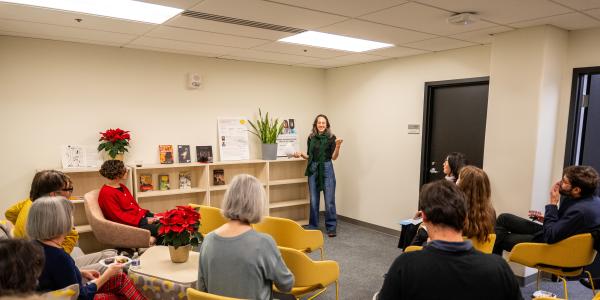Workshop participants G’Ra Asim, Nancy E. Berg, Todd Decker, and Julia A. Walker trade notes on each other's work in free-flowing feedback sessions, allowing them to see their subject matter from different perspectives.
What happens when you put a professor of music, the chair of WashU's performing arts department, a Hebrew translator, and a punk rock scholar of literature in the same room to collaborate?
The Center for the Literary Arts’ Creative Practice Workshop has conducted this scholastic chemistry experiment throughout the Fall 2024 semester. Each of the workshop’s four uniquely qualified participants – G’Ra Asim, Nancy E. Berg, Todd Decker, and Julia A. Walker – has spent the semester on leave from classroom instruction to focus on a creative passion project. Each week, one member of the quartet submits a piece of their work for critique and feedback from their workshop colleagues.
The ensuing conversations, moderated by CLA co-director Danielle Dutton, take on the air of a complex game of literary tennis, with each member contributing ideas from a different vantage point. At a November session of the workshop, a review of Asim’s latest work spun off into a conversation about major and minor musical scales, expanding on a metaphor that Asim was using to organize his writing.
Decker, the Paul Tietjens Professor of Music, described the musical theory underpinning major and minor keys, and how they play out in Mozart piano concertos and church hymns. Berg, a professor of Hebrew language and literature, noted the use of minor keys in Jewish folk music. Walker, chair of WashU’s Performing Arts Department, inquired to learn more about the book that inspired Asim’s approach to this passage, Cathy Hong’s Minor Feelings.
It's a glimpse into how all four participants leverage their expertise to interrogate and elevate each other’s writing.

“This particular group of readers is special, since the other fellows are all involved in music and/or performance,” said Berg, who is compiling an anthology of Israeli literary translations for her workshop project. “It has made me even more conscious of the sound, the rhythm, and the pacing of my translations and my introductory passages. Because they come from outside my field, they ask unexpected questions and point out places that need explanations or clarifications.”
Asim’s in-progress book, which explores the pitfalls of dating in a rapidly changing world, will be shaped by the group’s discussions on social media and society.
“People conduct themselves as if they are being surveilled by these various portals, even when they're not on them,” Asim said as part of the feedback session. “And they conduct themselves that way because they are surveilled by them.”
Decker, who is penning a memoir on listening to and playing classical music, has found it refreshing to dive into topics outside of his field of expertise.
“I've gotten a glimpse into how my colleagues approach writing as a craft,” Decker said. “Just hearing how they talk about method or strategies has made me rethink my own ways of doing things and refreshed my sense of how I approach writing as a task.”
The group feedback sessions have tangibly impacted each participant’s work, often encouraging new structures or strategies as part of the writing process.
For her workshop project, Walker is adapting a nonfiction book into a stage play, including a first act that will dramatize ancient myths. In her first draft, Walker featured the biblical story of the brothers Cain and Abel. But other members of the Creative Practice Workshop cohort raised concerns about how the tale’s inclusion might impact the play’s overall narrative.
“I realized that, among the three myths I was dramatizing, it was the least helpful, so I cut it,” Walker said. “Even though Cain and Abel was in my source text, I realized it didn't ‘translate’ to the stage in the ways I needed it to.”
Arts & Sciences tenured and tenure-track faculty can apply for the Spring 2026 Creative Practice Workshop, with materials due on March 17, 2025. Learn more on the Center for the Literary Arts’ website.





